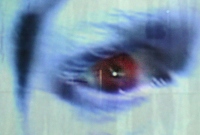 |

Mary Brennan
THE HERALD
12th February 2008
www.theherald.co.uk |
 |
| in Glasgow ... | Ljubljana, Slovenia « |
'It's over for another year: all the milling around the upstairs/downstairs and outdoor reaches of Tramway. No more scanning each day's diary of events trying to work out a time-line - wondering if "time-line" is really a National Review of Live Art (NRLA) euphemism for "queue". The NRLA quickly acquires sell-out status, so ticket-holders need to get in line for limited-capacity shows, and that threatens to become the image many will take away from this unrivalled, multi-faceted celebration of creative performance.
Queuing, however, is worth every moment when it brings you into contact with a solo work such as Almost the Same, Julia Bardsley's visceral excursion into the warring selves inside her (and all of us, if we lay bare our feral impulses). The sense of ritual and alchemy begins in an "ante-room" housing costumes and artefacts that hint at subversions from our apparently civilised norm: motherhood as a many-teated strap-on apron, sticks in the mind. The performance begins with Bardsley as a primitive, snarling dam (her Black incarnation) who, in giving birth to two hares, initiates the mesh of symbolism, superstition and sacrificial process that conditions and informs so many lingering concepts of female-ness, fertility and regeneration. Her evolution through Red into White - face masked, but body exposed in an assortment of straps - is played live behind a projected image of another apparently civilised self, who relentlessly chivvies Bardsley into sublimating her animalistic instincts, even when doing so necessitates acts of brutality that cannot be disguised. This film image is, however, hare-lipped, and this reminder of the feral self also produces a speech impediment Bardsley uses to reinforce her theme of "almost the same".
One little letter comes between same and shame, just as rite and right sound identical but could be poles apart. This is an epic venture, thrumming with ancient knowledge and modern insights into the roles and status accorded to women. And because Bardsley does not flinch from depicting the aggression, fear, humiliation and cruelty that attend this battle of wills, the piece leaves you unnerved, and, perhaps, more alert to the pack mentality of queuing.'
| |

